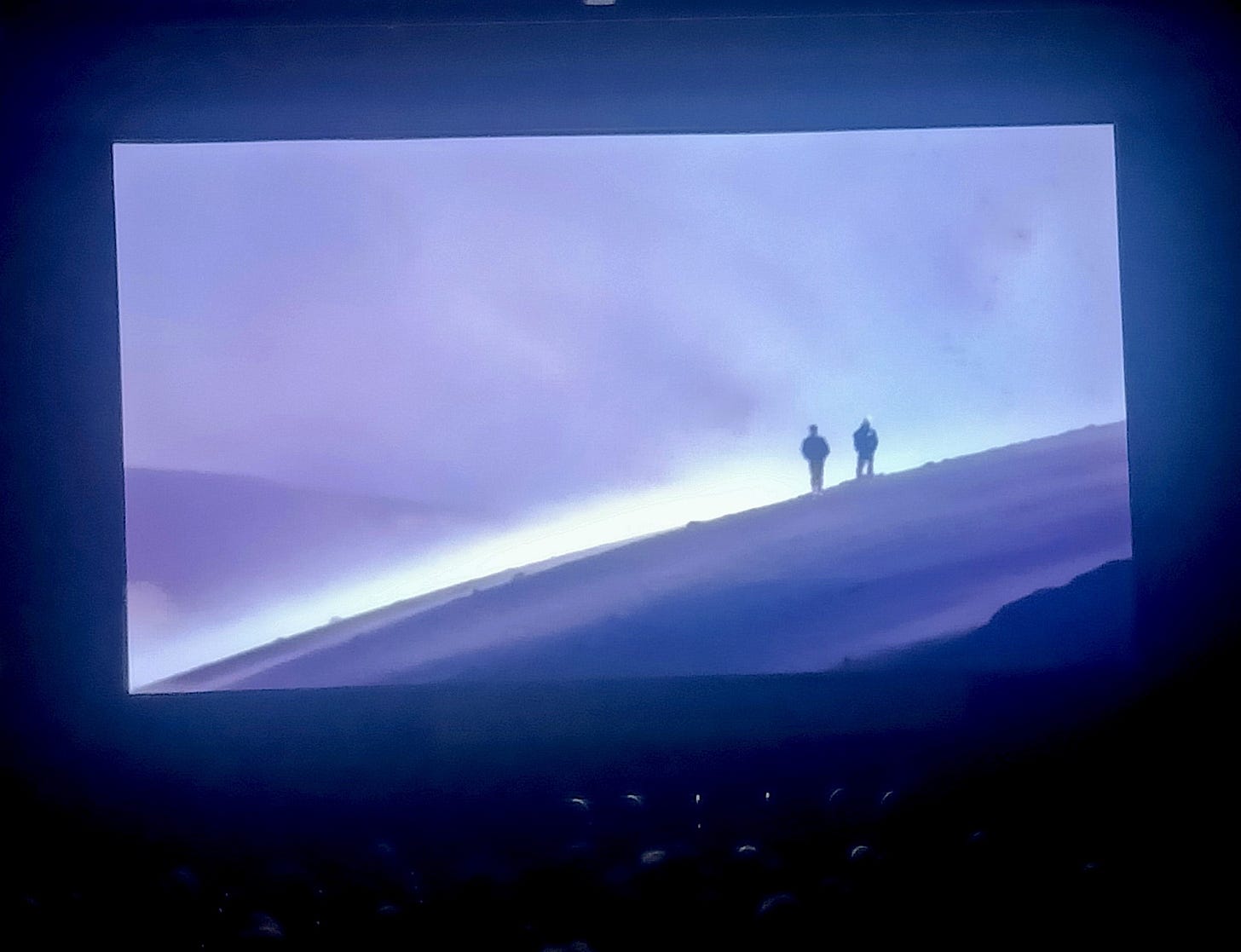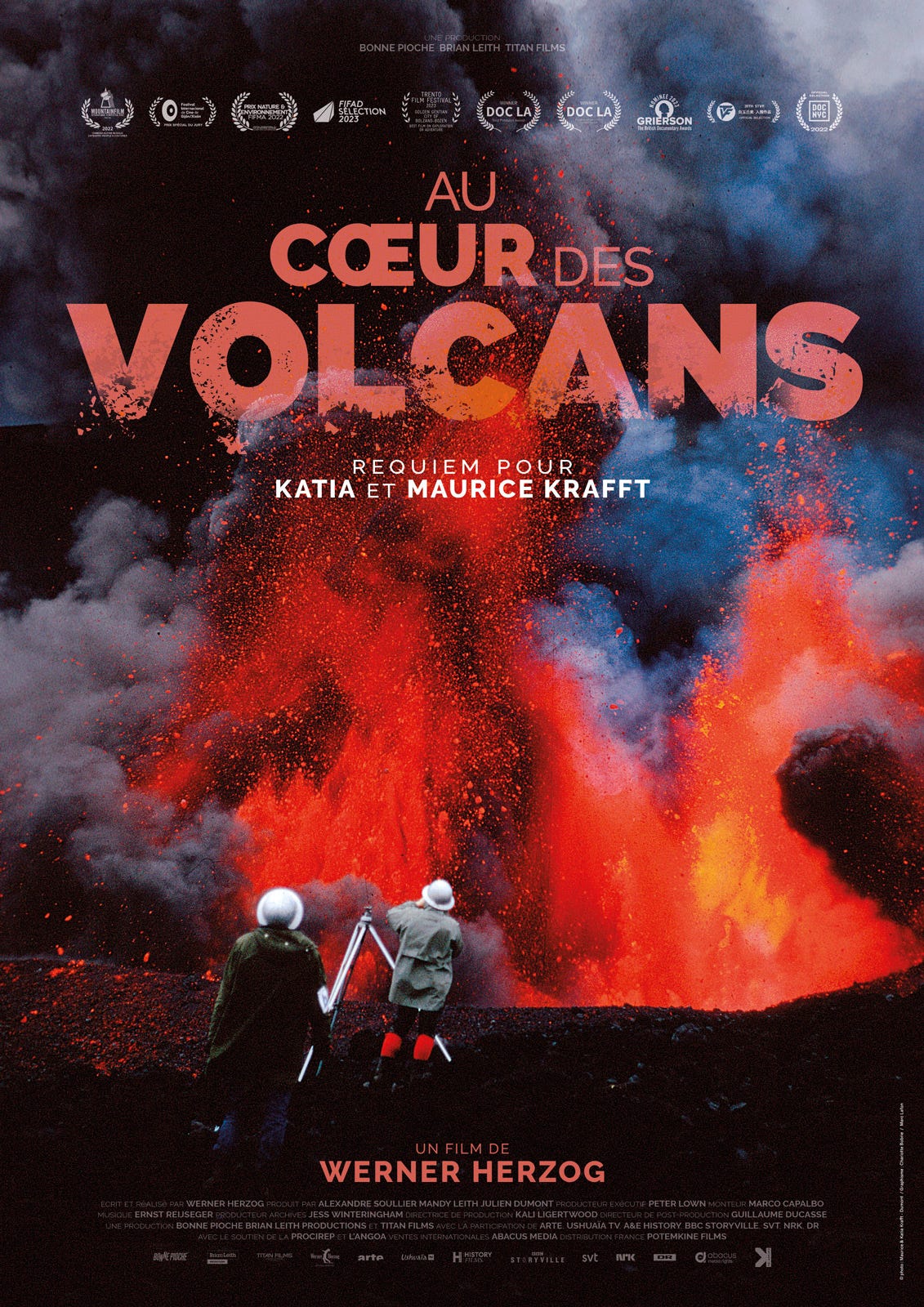Dancing with Volcanoes
Centre Pompidou, Paris
The film is over, the blank screen a mile away. Crowd shifting in their seats, whispering to the person sitting next. They’ve been inundated for the last hour and a half with torrents of fire out of the bowels of the earth, images of havoc, destruction and the blind forces of creation.
Three men fill the seats on a platform below the huge, hovering, silent screen. At one end the interrogator, at the other the translator, in the middle, the Magician himself.
As he did during the narration of the film, during the discussion he repeatedly employs the words ‘dream’ and ‘never seen before’ — bit like a carnival barker. By dreams he means, not our typical replay of yesterday’s events but an oneiric state, a waking dream in which the viewer confronts a convulsive beauty.
‘Never seen before’ can mean so many things: something indeed original, which is vanishingly rare. Everyone tries for that, ah bah oui, but few manage the trick. It’s a fair guess that everyone has seen stereotypical images of volcanoes. I’ve been there, at Pompeii and Moana Loa, where I held my grandmother’s hand as we crossed undulating black fields, sulfur winds escaping through the vents. She walked gingerly in low heels and looked to be having the time of her life.
Au Cœur des Volcans is the story of Katia and Maurice Krafft, French volcanologists, from their first meeting in Alsace to travels around the world filming the angry gods, and finally their death in an unexpected lava surge in Japan in 1991. So, indeed, the love story of two adventurous people. Fuzzy footage captures them in their orange hazmats, not fleeing, filming as the pyroclastic flow from Mount Unzen rushes straight at them — an unforgettable image. Such a small thing, man, when confronted by tons of lava hurling down the cleft of a mountain, scorching everything in its path. They stayed where they were and met their fate together.
Created from the Krafft’s archives, Au Cœur des Volcans moves gracefully between a non-narrative meditation on the sheer power and destructive beauty of volcanoes and the straight story of two kids from neighboring villages inseparable in life and death.
A volcano is one way the earth reinvents itself, becoming an artist of its own creation. The film is simultaneously celebration (of the two Kraffts), meditation and trance. The last part of the film is volcano footage from around the world, Moana Loa in Hawai’i especially. Flowing rivers of red lava filmed from impossibly close-up, Katia in a silver suit walking across a black field towards a fiery current moving à toute allure — at a sluggish yet surging, fearsome speed. Only water can stop it. Leveling anything in its path it charges into the ocean where it extends the territory, a jetty into the sea. A perfect metaphor of creative action rumbling under the surface, giving off smoke before it erupts, overwhelming objective terrain (the facts) with subjective force.
Volcans harkens back to an older era of Sensaround and disaster epics, meant to produce thrills and chills, making the viewer feel they’re at risk, too. The soundtrack, full of choir ensembles and wild voices, turns the movie theatre into a kind of chapel of aesthetic contemplation. Some of the sound is a bit rich for my poor taste. Silence would have served just as well.
The interviewer was out of it, glancing at his notes and asking the usual pointless questions. (Another clueless gatekeeper. Where do arts bureacrats come from ?) So it goes! The Magician is 82 now but dealt with the man’s fumbling attempts at communication with a kind of acerbic patience.
There weren’t any tickets left by the time I got to the Pompidou for the premiere, so I want to thank the lady at the door who let me slip in after the crowd had taken their seats. I grabbed the last one, in the last row, a football field away from the screen.
You’ve already guessed that the Maestro is Werner Herzog, a filmmaker who, among other things, specializes in Doomed Dreamers. Like White Diamond and Grizzley Man before it, Volcans is an evocation of the Tortuous Sublime, the personal apocalypse of Those Who Go Too Far.
Magician ? Herzog calls himself ‘a soldier for cinema’ – see his rules for filmmakers below. And see Volcans, or Volcanoes or whatever they’re calling it where you are, the bigger the screen the better.
Au Cœur des Volcans, directed by Werner Herzog, written and narrated by Herzog, edited by Marco Capalbo, music by Ernst Reijseger, from an original idea by Pete Lown. French premiere December 16 at Centre Pompidou.
°
Werner Herzog’s field notes
1. Always take the initiative.
2. There is nothing wrong with spending a night in jail if it means getting the shot you need.
3. Send all your dogs out and one might return with prey.
4. Never wallow in your troubles, despair must be kept private and brief.
5. Learn to live with your mistakes.
6. Expand your knowledge and understanding of music and literature, old and modern.
7. That roll of unexposed celluloid you have in your hand might be the last in existence, so do something impressive with it.
8. There is never an excuse not to finish a film.
9. Carry bolt cutters everywhere.
10. Thwart institutional cowardice.
11. Ask for forgiveness, not permission.
12. Take your fate into your own hands.
13. Learn to read the inner essence of a landscape.
14. Ignite the fire within and explore unknown territory.
15. Walk straight ahead, never detour.
16. Manœuvre and mislead, but always deliver.
17. Don’t be fearful of rejection.
18. Develop your own voice.
19. Day one is the point of no return.
20. A badge of honor is to fail a film theory class.
21. Chance is the lifeblood of cinema.
22. Guerilla tactics are best.
23. Take revenge if need be.
24. Get used to the bear behind you.
Many thanks for pitching in with your time. I hope you hated it, enough to leave an irate, messy, human comment. Everything we read should be an adventure, not information. So! If you’re in a good mood, a cup of coffee goes a long way to warm a writer in winter. Subscriptions are just overhead and a paying subscription gets you a special mass at the church of your choice. Ask anything you want about Europe, our experts are standing by.




